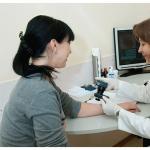Speech therapy classes for the child on the development of speech. Speech development of preschool children. When to contact a speech therapist
Classes with a speech therapist-defectologist are offered in our program in two forms:
- group (developmental lesson)
- individual lesson

A speech therapist-defectologist is a doctor specializing in the development and correction of speech. Its main task is to create a comprehensive assessment of the state of speech in children. In addition to mastering the correction technique, oral and written speech, speech therapist-defectologist has knowledge of neuropathology, pathology of the organs of hearing and speech, psychopathology.
The main work of a speech therapist-defectologist is a comprehensive examination of children who have learning difficulties (most often preschool age)
When to contact a speech therapist:
- Late development of speech;
- Defective sound reproduction or impaired understanding of speech;
- Stuttering.
Main goals:
LOGOPEDIC:
- Elimination of defects in sound pronunciation (education of articulation skills, sound pronunciation, syllabic structure) and development phonemic hearing (the ability to carry out operations of distinguishing and recognizing phonemes that make up the sound shell of the word).
- Skills development sound analysis (special mental actions to differentiate phonemes and establish the sound structure of a word)
- Clarification, expansion and enrichment of the vocabulary of older preschoolers
- Formation of the grammatical structure of speech.
- The development of coherent speech in older preschoolers.
- Development of communication, success in communication.
DEFECTOLOGICAL:
- Implementation of early diagnosis, determination of ways to prevent and coordinate mental disorders.
- Selection, systematization and improvement of techniques and methods of work of a defectologist in accordance with the program content.
- Comprehensive development of all mental processes, taking into account the capabilities, needs and interests of preschoolers.
- Providing conditions for the socialization of children.
- Ensuring parents' awareness of overcoming problems in children, the optimal inclusion of the family in the correctional and pedagogical process.
LOGOPEDIC MASSAGE Is a method of mechanical action that changes the state of muscles, tissues, nerves of the peripheral speech apparatus. It belongs to speech therapy techniques that help normalize pronunciation. This type of massage is successfully used for dysarthria, stuttering, rhinolalia, problems with muscle tone and other speech disorders. Suitable for different age groups - children and adults.
Goals of speech therapy massage:
1. Normalization of muscle tone.
2. Increase in the volume and amplitude of articulatory movements.
3. Formation of voluntary articulatory movements.
4. Activation of sedentary muscles of the speech apparatus.
5. Reduction of pathologies of muscle movement - kinesis, seizures, etc.
6. Correction of paresis and muscle paralysis.
Features of speech therapy massage:
Speech therapy massage can be performed by: a speech therapist, a speech pathologist or a medical professional who has undergone special training. It is usually produced in conjunction with articulatory gymnastics. Parents can master some simple techniques of speech therapy massage in order to do them to their child.
The human face is rich in nerve endings and blood vessels, which makes it especially susceptible, both to external influences (weather conditions, temperature conditions in the room, massage) and to internal changes in the body (expression of the emotional state in the position of the corners of the lips and eyes, redness from excitement, etc.) ... It is this sensitivity that contributes to obtaining the effect of speech therapy massage. As a result of the specialist's actions, blood and lymph circulation improves, nerve endings are stimulated, followed by reflexes and, thus, the activity of all important systems - the circulatory, lymphatic, central nervous and muscular systems, is activated.
sent
Anna Mettus
Teacher speech therapist
Characteristic
states of speech development
Dana full name child, born ...
F.I. passed the district IPC (date) in the GDOU No. (protocol No.) and was sent to the GDOU of the compensating type for children with speech impairments No. general underdevelopment speech level 111, dysarthria for 1 year.
From the anamnesis:
Child from 2nd pregnancy, 2nd birth (3650.53), Apgar 8-9 points. During the neonatal period, he suffered jaundice. Up to 1 year: frequent ARVI, identified by FSS. Physically developed according to age. ZRR was noted.
As a result of speech therapy examination in February 2012 Revealed.
- Understanding of addressed speech within everyday life, age norm.
- The state of the articulatory apparatus: trauma to the upper teeth.
- State of speech motor skills: tongue movements are inaccurate, the ability to switch is reduced.
- Sound pronunciation: polymorphic. In isolation, he can pronounce sounds correctly, but with an increase in speech load, general blurred speech is observed. There is a mixing of sounds in terms of hardness-softness, voiced-deafness.
- The rate of speech is normal, the speech is illegible, not expressive, the sounds are pronounced indistinctly.
- Phonemic perception is difficult. Cannot repeat syllables with oppositional sounds. Copes with the selection of a stressed vowel from the beginning of words, the first consonant.
- The syllable structure of words and sound filling are violated. There is a tendency to simplify the structure of the word, the loss of consonants when they converge.
- Vocabulary. Vocabulary - low age norm. Names and summarizes items by lexical topics: toys, dishes, clothes, shoes, animals, birds, furniture, transport. Allocates the 4th superfluous from the group of objects, explains his choice. Difficulties in naming parts of clothing, dishes, furniture, naming professions. Doesn't always use words accurately. In speech, he often uses nouns, verbs, less often adjectives and adverbs.
- The grammatical structure of speech is a low age norm. Errors in word formation and inflection. There is an inconsistency of words in a phrase, incorrect use of prepositions. In speech, she uses simple common sentences, distorted compound sentences. Can retell a short story using questions. Self-compilation of statements is difficult.
By the end preparatory group I have not mastered the program enough: there is a lack of development of the components of readiness for school education and difficulties in mastering the program material.
The author is pleased, it's not difficult for you - click "I LIKE"| Like |
The main task of speech therapists is to correct speech disorders in children, to prevent their subsequent occurrence. Many remember how the incomparable Rolan Bykov played a representative of this profession in the film "For Family Circumstances" - his "logopeft" himself suffered from "defects of sin and fiction", but confidently offered his help.
What are the main reasons for going to speech therapists? Parents are often worried that their child does not pronounce the letter "r" or other letters and sounds, "misinterprets" words or does not pronounce them clearly. At a certain age, you can close your eyes (or rather, ears) to this, but if the problem is not resolved for a long time, you need to contact a defectologist. There are various centers in our city with professionals specializing in speech development.
Thanks to classes that combine traditional and modern methods - often with elements of a game - the children correct their speech errors, learn to pronounce all sounds and letters. It is worth paying attention to original activities - for example, speech therapy fitness, which, in addition to all of the above, improves physical health and the stamina of boys and girls.
Child speech problems: do not panic, but solve
An experienced speech therapist, neurologist or psychologist can easily understand whether a child has problems related to the development of speech. There may be a lot of reasons for this, but there are several solutions. Parents should definitely talk with the child, involving him in dialogues, increasing his vocabulary. It is also good to combine this activity with the game for greater efficiency. Of course, a professional speech therapist can also help a child, but the main burden falls on the parents. Alternatively, medication that improves blood circulation can help overcome speech errors and problems. In some cases, micropolarization is indispensable - this is a method that affects brain cells through a small direct current. It has a positive effect on sensory and cognitive function.How to teach a child to pronounce the letter "p"
Speech therapists are unanimous in their opinion: one of the most difficult tasks for a child 4-5, or even 6 years old is the pronunciation of the letter "p". Children replace it with other sounds, or even replace a word that contains "r" with another, close in meaning. This problem must be approached gradually. It is wrong to immediately ask the child to pronounce words or, moreover, sentences with a "stubborn" letter. First you need to “taste it” and master simple syllables: ri, ir, ro, op, ar, ra, etc. Of course, each lesson should be fun for the child - that's when he will be interested and will be able to join the lesson. They should be regular until the letter "bounces off the teeth." This will take time, so be patient. After the child has mastered simple syllables, you can move on to words, and then to sentences and tongue twisters. You can also practice auxiliary exercises - various warm-ups for the lips and tongue, during which "p" is not pronounced. In addition, it will not be superfluous for parents to watch video lessons that are devoted to the pronunciation of this letter. Moms and dads should also remember that not only the speech therapist is involved in the normalization of the child's speech, but they themselves - and even to a greater extent.I often hear questions from worried parents:
- When should my baby start talking?
- And we are two years old, we are silent, is this normal?
- My four-year-old child does not speak the sound [R]. Do we have to wait or is it time for a speech therapist? etc.
In essence, these questions are about whether the development of a particular child corresponds to the norms of speech development. One has to deal with the increased anxiety of parents (- But the neighbor's two-year-old is already reciting poetry, but mine still cannot do that!) And with a careless attitude to speech development (- Oh, he wants to - he will speak. The little one will grow up, “he will speak out”.)
Below are the approximate milestones in the speech development of preschool children, advice to parents, signs of problems that will require the help of a specialist.
The development of the speech of children from one to three years.
The first words usually appear about a year (for example, ma (mom), yes (give), aw (dog), etc.) At about a year and eight months, the first phrases appear in the baby's speech (yes pi (let me drink), let ati (give a ball), lala bai (the doll is sleeping), etc. By the age of two, the first sentences of three or four words appear. A three-year-old baby is able to communicate in complex sentences ("Mom went to the store, and dad is at home"). By the age of three the child pronounces most of the sounds of the Russian language correctly.Many children by this age lack the sounds [Ш, Ж, Ч, Щ, Л, Р, Р '(Pb)].
Of course, each child has his own, individual pace of development, much depends on the character, temperament, heredity, conditions of upbringing.
Also, the reason why sounds [W, F, H, W, L, L '(L), R, R' (Pb)] do not appear in the speech of a three-year-old child may be a short sublingual ligament ("bridle"). For the correct pronunciation of these sounds, a sufficient lift of the tongue is needed. If the short "bridle" "does not allow" the tongue to rise to the palate, the child will not be able to pronounce the sounds correctly.
When to contact a speech therapist.
If your child is about two and a half to three years old and he is silent, or says only a few words, the phrase is missing - this is a reason for consulting with specialists (speech therapist, psychologist, neurologist). In such cases, a neuropathologist or speech therapist makes a diagnosis of RAD (speech retardation).
If the baby starts to stutter. The sooner you turn to a speech therapist and neurologist with this problem, the more chances that stuttering will not get fixed, will not worsen.
Worried before two and a half years worth it if:
child 1.5-2 years old does not understand simple instructions (for example, show a cat in a book, bring a ball);
a two-year-old child is noticeably different from his peers, his games are monotonous, stereotyped, or the child does not show interest in toys at all; the baby cannot cope with simple tasks (for example, collecting simple "inserts", stringing very large beads on a thick wooden "needle"), that is, there is a noticeable lag in the general development of the child. In these cases, it is necessary to show the child to a child psychologist, speech therapist, neuropathologist, otolaryngologist immediately.
Pay particular attention to the timing of speech and overall development it is necessary if the pregnancy or childbirth was complicated. Negative factors in the course of pregnancy and childbirth can cause a delay in speech and mental development.
Kid at a speech therapist's appointment.
During the examination, the speech therapist will assess the understanding of the baby's speech, the structure of the articulatory apparatus (the state of the hyoid ligament, tongue, lips, etc.), the state of visual and auditory perception, the compliance of the child's general development with the age norm. Often, children and a speech therapist need several sessions so that the child gets used to the specialist, "opens up". Then the speech therapist will have a complete and accurate picture of the state of speech and the level of development of your baby.
Survey results.
If the understanding of speech corresponds to the age norm (the child shows most of the subjects about which he is asked; understands the speech therapist's questions well), there are no serious violations in the structure and work of the articulatory apparatus, the general development corresponds to the age norm - this is a "favorable" variant of ZRR (speech delay) ... Most likely, your silent talker will begin to speak when he considers it necessary and by the age of 3.5 he will practically catch up with the other guys in speech development. The speech therapist will show you techniques with which you can activate the baby's speech at home.
If the examination reveals a decrease in general development (the baby knows and can do much less than "should" by age), understanding of speech is much lower than the age norm - help should be provided to the child immediately. It is necessary to undergo an examination (appointed by a neurologist), to exclude hearing loss (to make an audiogram). Timely started treatment, systemic sessions with a speech therapist, a speech therapist, homework with parents will help develop the child's speech and other mental functions (attention, memory, visual and auditory perception, logical thinking), to prevent further lag.
Advice to parents.
The child's speech develops in two situations: when he hears someone else's speech (comprehends it) and speaks himself. That is, the more you talk with your child, talk with interest about the world around you, answer his questions and ask them yourself, read children's books to him, encourage him to talk about what he saw, the better your child's speech will be. Usually the child is interested in talking about what he is seeing at the moment. At the same time, it is important not to overload the child with information that is difficult for him, not to force him to answer your questions if he is tired or simply does not want to talk now.
It will take a long time for a kid to learn how to correctly coordinate words in a sentence. The grammatical system of the Russian language is complex - there are many exceptions to the general rules. For example, the kid already correctly uses the endings of the instrumental case of nouns -om, -em (to throw a stone, a ball). By analogy, it forms other words (eat with a spoon, wipe with a rag). This is a normal process of a child's assimilation of the grammatical system of the Russian language. The adult's help consists in correcting such mistakes - repeating the correct (normative) form of the word (it is better to pronounce it several times or give several similar examples). Such "amendments" should be as tactful and benevolent as possible.
Speech development is closely related to development fine motor skills... Therefore, laying out a mosaic, stringing beads, modeling, drawing, designing, finger gymnastics - a significant contribution to the development of speech and intelligence of the baby.
Rules for conducting classes.
Any activities with the baby are carried out only in a playful way, if the child wants to play with you.
The duration of the lesson for preschoolers (depending on temperament and age) is from 8 to 25 minutes, for children 6-7 years old - 15-30 minutes.
Be sure to praise your child for even the smallest and most "insignificant" successes.
- Batyaeva S. V., Savostyanova S. V. Album on the development of speech for the smallest.
- Novikovskaya OA Speech therapy grammar for children 2-4 years old.
- The Tale of the Merry Tongue. Articulation gymnastics for the little ones.
The development of the speech of children 3-5 years old.
At this age, there is an active expansion of vocabulary (the number of words that the child knows). His speech becomes more and more correct, detailed. The child uses complex sentences (“The cat ran away because she was frightened by the big dog”). A five-year-old can relate coherently about a recent event, retell a familiar fairy tale.
Normally, by the age of five, children master correct pronunciation all sounds. It is believed that if by the age of five a child has not learned how to pronounce certain sounds correctly, spontaneously, these sounds will not appear in speech. The help of a speech therapist is needed. If a child mispronounces a large number of sounds, sound production classes can be started from four and a half years old.
When to contact a speech therapist.
If only you understand your four-year-old child;
if the words in the sentence are often not consistent (he fell, red jacket);
if the baby constantly rearranges the syllables in words or "loses" them (for example, sakomat (scooter), aasin (orange), mitzanet (policeman);
if he cannot coherently (three to four sentences) talk about what he recently saw (for example, a trip to the zoo).
Especially need to be attentive to those parents whose children began to speak late. Often, the speech of such children develops with a delay. In the future, this may lead to problems with academic performance in the Russian language, and not only.
Make an accurate diagnosis, develop a plan correctional work in this case, only a speech therapist can.
Most kindergartens have speech therapists. They identify children whose speech development is below the age norm. If the child has not only the incorrect pronunciation of sounds, but also the underdevelopment of the other components of speech, it is recommended to visit a speech therapy group.
Allowances for self-study for parents with children.
- Volodina V.S. Album on the development of speech.
- Kosinova E. M. Lexical notebook number 1 (2, 3, 4).
- Kosinova E. M. Grammatical notebook number 1 (2, 3, 4).
- Novikovskaya O.A. Speech therapy grammar for children 4-6 years old
- Polyakova M.A.How to teach a child to speak correctly.
The development of speech in children 5-7 years old.
At this age, the setting of absent or incorrectly pronounced sounds comes to the fore, consolidation of their correct pronunciation and clear distinction, preparation for school (prevention of school failure).
To be successful in school, a child needs to know a lot and be able to.
Below are approximate criteria for school readiness (for the development of speech).
To the beginning school education the child "should":
have a large vocabulary, be able to retell a short text, tell about an event, freely express your thoughts, prove your point of view;
grammatically correct your speech (correctly coordinate words in a sentence, use prepositions accurately);
correctly pronounce and distinguish well all sounds;
possess some skills of language analysis and synthesis (be able to divide words into syllables, highlight the first, last sound in a word (name all sounds in order in small words);
Most of the mistakes made by the child in oral speech - imprecise pronunciation compound words (water supply - plumber), incorrect agreement of words in a sentence (think of airplanes, five balls), sound substitutions (drying - sucking, hand - bow) will lead to similar mistakes in writing. Underdevelopment of coherent speech (the ability to accurately and consistently tell about an event) can lead to difficulties in writing statements, retelling, oral answers.
Condition is very important phonemic perception - the ability to "hear" sounds in a word, to correctly determine the sequence of sounds and syllables. Underdevelopment of phonemic perception leads to numerous, persistent mistakes when writing, because in order for a child to write a word correctly, he must "mentally" decompose the word into sounds, and then reproduce them exactly, in the correct sequence on paper. Teaching the child to read promotes the development of phonemic perception.
When to contact a speech therapist.
If your child is already five years old, but he or she mispronounces or replaces some sounds;
if you observe the above problems in your child.
A year before school, I would recommend showing your child a speech therapist to every parent, even if your child pronounces all the sounds correctly.
The purpose of a speech therapy examination before school is to identify a predisposition to reading and writing impairments (multiple specific mistakes), the so-called. called dysgraphia and dyslexia, i.e., in fact, to school failure.
It is very likely to reveal such a predisposition of children to dysgraphia and dyslexia at preschool age.
If timely work is carried out aimed at developing the processes responsible for the formation of the processes of reading and writing, you can prevent or significantly reduce the likelihood of school problems.
The importance of the timeliness of this work is explained by the fact that it is much more difficult to correct this situation at school than to prevent it at preschool age. The same applies to the production of sounds.
Based on my practice, up to eighty percent of children in the kindergarten kindergarten need the help of a speech therapist. If you have a speech therapist in your garden, help will be provided free of charge. All you need to do is do your homework (consolidation of the material covered) and control over the correct pronunciation of the sounds set. There are also speech therapists in children's clinics.
Allowances for self-study of parents with a child.
Novikovskaya OA Speech therapy grammar for children 6-8 years old.
Polyakova M.A.How to teach a child to read and write correctly.
Zhukova N. S. Primer.
Polyakova M.A.Tutorial on speech therapy.
In conclusion, I would like to add that in one article it is impossible to present all the information about such a "global" period in the speech development of children, which is the preschool age, and, moreover, to give precise recommendations in each specific case (this can be done only after examining the child ).
I hope that the article will be useful for parents of preschoolers, help them navigate the speech development of your child, see problems (if any) in time and help the child overcome them.
Teacher-speech therapist DOE number 2 "Rosinka" Efimova Maria.






